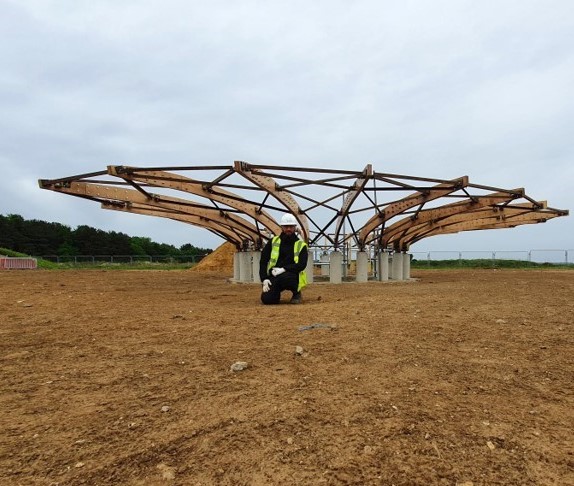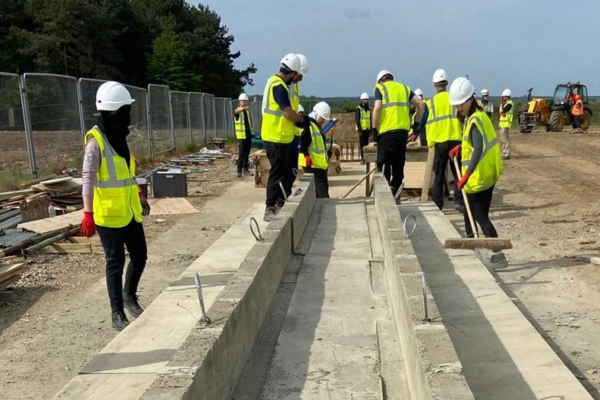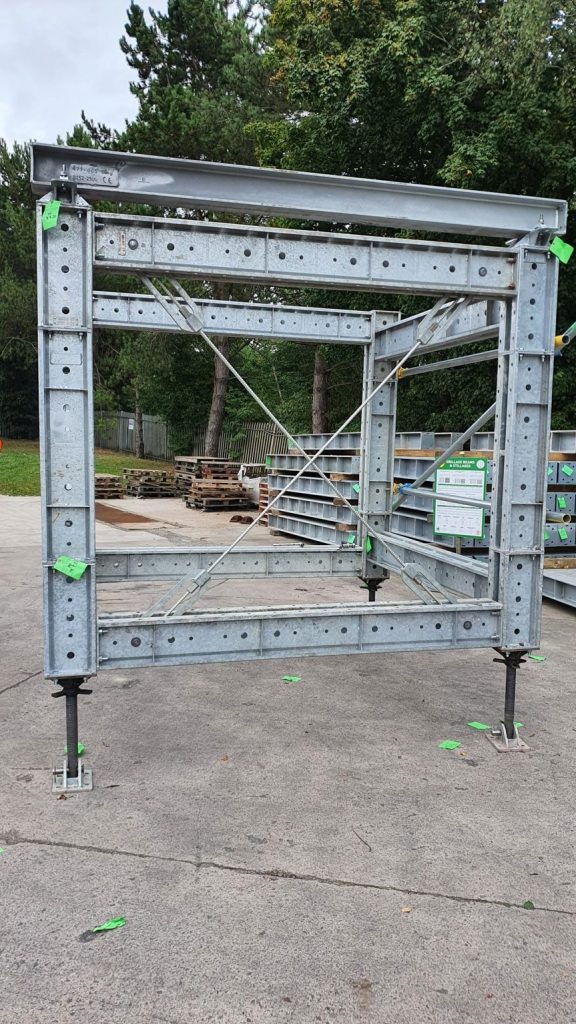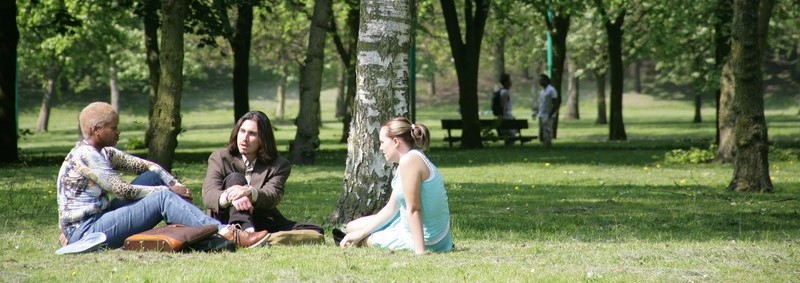Hear from Adil Khurshid, a third year BEng Civil Engineering student, who undertook a three-month placement at MGF through his Temporary Works Forum (TWf) scholarship.

Can you tell us about your placement?
Over the summer, I spoke with the director of Temporary Works Forum who put my CV out on the forum. MGF then reached out to me. It was an amazing opportunity to see how the industry operates and it improved my engineering knowledge and judgement in so many ways as I got to see what goes into an actual job.
What projects did you work on?
I’ve worked on several projects in ground shoring and structural support solutions. I gained hands-on experience on one real life project where a company required some needle and propping solution which held the existing masonry up. I was able to contribute to the design and see what I’d done come together in the end. The UniShore product was installed into the opening temporarily to install the new glass façades and panels. With ground shoring, it was lots of different jobs such as creating safe spaces and opening for any pipeline fixes or installations of tanks etc.
Tell us about your interest in engineering.
I’ve always been interested in engineering since high school, and I found it fascinating to learn about what goes into a building. During university, there were also site visits that helped me to grasp what happens in construction. University modules allowed me to get first-hand experience such as constructionarium where I was the Project Manager for the Naples Canopy project. It was quite an amazing experience as the project was completed, and I saw how we dealt with day-to-day tasks and how to problem solve on the spot.
At times, it was challenging but overall, it was rewarding when I had to manage my team, send my team on and off breaks, manage materials that weren’t accessible, and to coordinate all the tasks for everyone.

Did you have any prior civil engineering experience before starting your course/placement?
I did have some prior experience with United Utilities on a six-month project, working with engineers. During that time, I presented professional reports about sustainable wastewater treatment and helped engineers design pipes for a case study we worked on. We got awarded with the Golden Crest Award.
When did you start thinking about applying for placements?
I didn’t start thinking about placements until second year, and I took advantage of my scholarship as this allowed me to connect with industry where I provided my CV and was invited to an interview shortly after. I’m glad I got my placement through my scholarship because it allowed me to grasp the importance of temporary works. Many employers in construction tend to disregard temporary works when it could actually save money in the long run instead of having a consultant or company do it from them.
Did you do anything to prepare for this placement?
Throughout my time at university, I’ve gained an understanding of structural behaviours and how bending movements work, and this knowledge is what got me the placement. I was asked to draw lots of different bending movement diagrams at my interview and asked lots of technical and personal questions about university in general. I think the University of Salford delivers structural modules well and the academics help you to develop yourself which is why my academic background helped me a lot before I started my placement.
‘Each conversation I had, I walked away learning something new. It gave me the opportunity to establish valuable connections with industry and improve my engineering skills and decision-making ability.‘
Adil Khurshid, Civil Engineering student
What skills have you developed during your placement?
The main skills I developed during my placement were organisation and time keeping skills. At times, I was analysing data to build designs for different soil profiles, calculating the pressure of soil pressure at different points, and working on writing design reports. When I was learning how to put design reports and calculations together, it required immediate problem solving, but I believe I learned through asking questions, getting advice, and acting on feedback I received.
With university, you’re studying so that you can submit an assignment and get a good mark, so you might not necessarily understand or grasp everything. Whereas industry timing is different, there’s an opportunity to learn in real time and it’s so much more than getting a grade. You’re trying to meet the demands of a client and you want to get it right the first time with an overall goal to be a competent engineer.
What do you think was the most difficult challenge and how did you overcome it?
One of the most difficult challenges was learning different terminology and methods of work that I wasn’t used to and picking this up quickly. For instance, MGF have certain ways of installing their products, which also factors in the health and safety and economical influences. In industry, you must take efficiency into account, and I had to learn on the job, particularly with the calculations and analysis as there are different sequences to learn. After two months passed by, I gained the knowledge to do things independently rather than asking repetitive questions and I began to understand the reason as to why I was doing things more.

What has been your favourite moment of the overall experience?
My favourite part was being surrounded by helpful people in the office. The environment was amazing because I was always learning different ways to do things and it lifted the mood. Each conversation I had, I walked away learning something new. It gave me the opportunity to establish valuable connections with industry and improve my engineering skills and decision-making ability.
Did you use any specialist equipment or facilities when undertaking your placement?
I did manage to go to the welding facility where they were making their new equipment and I also went to the depot to see how they refurbish and recycle certain equipment. In terms of software, I used AutoCAD, and I was also trained on CADS; a geotechnical software and the standard Microsoft Package.
What do you think are the benefits of it placement?
There are lots of benefits of placements because it broadens your knowledge of industry compared to academia. It develops your character and makes you aware of working hours, how to work to deadlines, and the reality of what happens in industry. Especially when you work on a project, you’ll appreciate the time and effort that has gone into a project to make it work.
You gain a lot of understanding on a particular subtopic and subject away from your academic knowledge because a lot of the things you won’t learn at university, but there will always be something new to learn on the job. In principle, the way of calculating shortcuts and everything would be different.
What advice would you give to future students who be interested in taking a placement?
The advice I’d give is to look for a company that wants to invest in you so will enable you to obtain professional chartership status. It’s important to ask questions at the end of interviews such as whether you’d receive sponsorship to do a masters or pay for your chartership so that you know they are keen in your professional development.
It’s also good to go somewhere that will give you mentors to help you during a placement. I’d recommend a smaller organisation as they will provide you with experience of a core engineer rather than bigger companies who would just give you training or admin related tasks. With smaller organisations, you’ll get involved in the actual projects. Also, think about where you want to be in three years’ time when you do join a company so think about your progression.
Find out more about studying Civil Engineering at Salford.
Watch our video below to find out more about constructionarium:





Leave a Reply